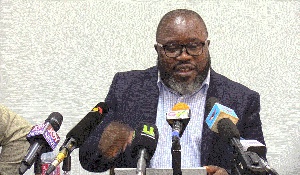 Education Watch Executive Director, Kofi Asare
Education Watch Executive Director, Kofi Asare
Executive Director of the African Education Watch Kofi Asare has disclosed that the suspension of schools in Ghana following the coronavirus pandemic has resulted in most students marrying and others also getting pregnant.
He said a research undertaken by his outfit indicates that most of the students are likely not to return to school if schools reopen in January because they will be married or pregnant.
Mr Asare was speaking in connection with the decision by President Nana Addo Dankwa Akufo-Addo to move the next academic year for nursery, kindergarten, primary and junior high schools (JHS) to January 202, after consultations with the Ghana Education Service (GES) and relevant stakeholders.
Second-year JHS students will, however, resume on Monday, October 5 to complete their academic work.
“The next academic year will resume in January 2021, with appropriate adjustments made to the curriculum, to ensure that nothing is lost from the previous year.
“The relevant dispositions will also be made so that the presence, at the same time, in school of all streams of students, can occur in safety,” the president said in an address to the nation on Sunday August 30
Schools were shut on Monday, March 15 in an audacious effort by government to curb the spread of Covid-19 a couple of days after Ghana recorded two index cases.
But speaking in an interview on TV3‘s New Day Tuesday, September 1, Mr Asare said: “The disadvantage of re-opening school next year has an issue to do with girls getting pregnant.
“Our research found out that 20% out of 200 schools that we tracked recorded girls, talking about JHS 2 and SHS 2, not returning to school on the account of marriage and pregnancy.”
He added that “learning loss will deepen as a result of inaccessibility to the e-learning program and a challenge especially with students living in the rural areas as compared to children living in the urban areas”.
He also noted that a lot of students are unable to access e-learning platforms in the country.
“There are records that about five million houses in Ghana have no electricity and are not able to subscribe to the e-learning channel platform content delivery for children who are at home and children living in rural areas.”
- Meet the only teacher taking care of an entire school in Afram Plains
- U.S. provides GH¢2.8 Million to aid licensing, monitoring and evaluation of schools
- Each One, Teach One: ADN kicks off Lifeline Literacy Project
- Parenting with a difference 101: Cheating in classwork a threat to national development
- GH¢68.5m for WASSCE passco - Minority wants OSP to probe expenditure
- Read all related articles












